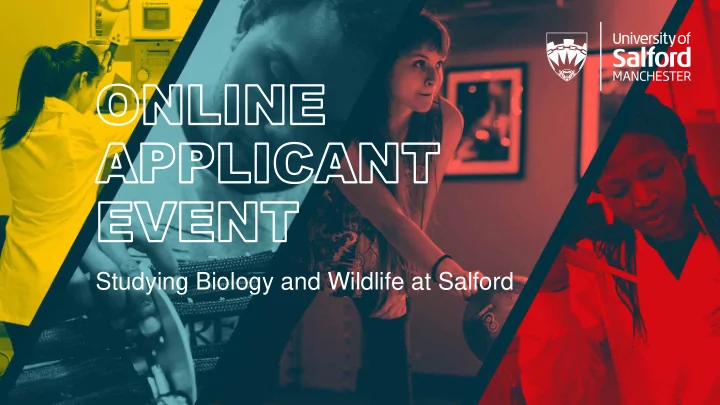

Studying Biology and Wildlife at Salford
Dr Danni Hinchcliffe - Teaching Fellow, Biology & Wildlife @dannihinchy
A bit about me… • Keen conservationist (Operation Wallacea, BTO, RSPB): bats and bird ringer, mammals and moth trapper, herpetology
A bit about me… • Keen conservationist (Operation Wallacea, BTO, RSPB): bats and bird ringer, mammals and moth trapper, herpetology • Dog-obsessed: volunteer with rescue charities and LOVE bull terriers
A bit about me… • Keen conservationist (Operation Wallacea, BTO, RSPB): bats and bird ringer, mammals and moth trapper, herpetology • Dog-obsessed: volunteer with rescue charities and LOVE bull terriers • Traveller and amateur photographer (I take better pictures of my food than I do of wildlife!)
Academic background • Masters in Biology from the University of Sheffield • PhD in Molecular Ecology from the University of East Anglia • Post-doctorate in Conservation Physiology, University of Manchester • Now full-time staff at the University of Salford!
Seychelles warbler • Using a combination of genetic and environmental tools to answer evolutionary questions • Studied an endangered island bird – the Seychelles warbler, Acrocephalus sechellensis • Applied my research directly to the species’ conservation and population management
Seychelles warbler • Down to 26 individuals in the 1970s on a single island “Cousin” • Birdlife International bought the island and restored native habitat • Teamed up with scientists to form management strategy
Seychelles warbler • Cousin population restored and four translocations carried out: • Aride (1988) • Cousine (1990) • Denis (2004) • Frégate (2011) • Current global population >3000 • CE NT (IUCN)
• Assessed bottleneck impacts on the population gene pool • Looked at genes responsible for innate immunity • Avian malaria and resistance • Identified the best birds to start up new populations on other islands
• Assessed bottleneck impacts on the population gene pool • Looked at genes responsible for innate immunity Cousin MALARIA 52% • Avian malaria and resistance • Identified the best birds to start up new populations on other islands
• Assessed bottleneck impacts Aride No malaria - 20 years on the population gene pool • Looked at genes responsible for innate immunity Cousin MALARIA 52% • Avian malaria and resistance • Identified the best birds to start up new populations on other islands
Cousine • Assessed bottleneck impacts Aride MALARIA 41% No malaria - 20 years on the population gene pool • Looked at genes responsible for innate immunity Cousin MALARIA 52% • Avian malaria and resistance • Identified the best birds to start up new populations on other islands
Cousine • Assessed bottleneck impacts Aride MALARIA 41% No malaria - 20 years on the population gene pool • Looked at genes responsible for innate immunity Cousin MALARIA 52% • Avian malaria and resistance Denis No malaria - 10 years • Identified the best birds to start up new populations on other islands
Cousine • Assessed bottleneck impacts Aride MALARIA 41% No malaria - 20 years on the population gene pool • Looked at genes responsible for innate immunity Cousin MALARIA 52% • Avian malaria and resistance Denis Frégate No malaria - 10 years Traces of Malaria • Identified the best birds to start up new populations on other islands
Welsh Mountain Ponies • Carneddau ponies managed by local farmers in Snowdonia • Developed faecal hormone biomarkers to identify ‘stressors’ Image • How does stress impact on pony health, welfare and reproduction?
Grevy’s zebras • Research Fellow at Chester Zoo • Studied populations in Kenya • Reserves managed by science • Reserves managed by tourism • Unmanaged populations • Environment and seasonal effects, the secrets to success for critically- endangered mammals…
Why the University of Salford? • As a new staff member I love incorporating my research (and conservation industry) experience into my teaching • I can take on students (third- year undergraduates and Master’s students) to get involved with these research themes • The University of Salford community is friendly, embracing, encouraging and supportive – you could be a part of it!
To see what other presentations are available today, please go back to our event hub
Recommend
More recommend